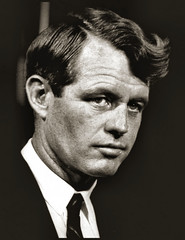If I would ever call someone my hero, Robert F. Kennedy would be on top of that list. Having just finished Thurston Clarke´s magnificent new book The Last Campaign on his presidential bid leading to his assassination in Los Angeles in 1968, my fondness towards this exceptional politician just grew stronger. Clarke - like a good journalist does - had combined extensive literary research and interviews with RFK staff with meeting normal Americans who met him often very briefly. Clarke´s ambition with the book is to explain why Robert F. Kennedy gave such hope to people and why his death is often seen as the end of politics of hope.
I admire RFK for his peculiarity and strength in idealism. He is characterised as a shy and slightly awkward person with a tendency to come across as arrogant. In his earlier years he made some drastic mistakes in his career such as approving the wiretapping of Martin Luther King but he did not allow this to stop him from changing course. As he beautifully explained his U-turn in terms of agenda when running for president, a previous misjudgement is no excuse for its continuation. He dared to be human, show emotions and admit having been wrong.
I am still most struck by the way he was moved by seeing people suffering, which often led him manically talking about the living conditions of African Americans in the Mississippi Delta or Native Americans in the reservations. He dared to step outside the normal "on the other hand" language and used words like immoral, right and wrong. According to his staff and the people who met him, Kennedy had an exceptional capacity to understand people´s conditions and see himself living in the same situation. He was driven into anger by the injustice and poverty within the United States, which led him to step on many toes, make unneccessary enemies and act in haste. He talked often about the equality of sacrifice if America wants to become truly one nation. This was for instance the reason why he was against freeing college students from Vietnam drafts. He explained his position simply on this issue as well in moral terms.
What makes him even more fascinating is that he was no softy social democrat when it came to politics. He always saw work-based assistance as the best way for people to lift themselves and their families out of poverty with still keeping their dignity. In the same way he had zero tolerance towards lawlessness - whether carried out by the ones oppressing or being oppressed.
When reading the descriptions of the emotions he generated especially in the African American and Latino communities, I find myself wondering how wonderful but scary hope is when it is truly released. People saw Kennedy as the man who could change things to an extent that threatened his life, made him lose shoes and shirts while making his way through crowds and made the establishment extremely worried. He was giving people a role and seeing them as the ones needed to change the course of America. As many of his opponents said in 1968, they were afraid of RFK as he was seen as someone who really would carry out his ideas on redistribution of wealth.
One only wonders what the world would be today if this man would have lived to be president and could have executed his dream of "taming the savageness of man and making gentle the life of this world." And why we have never seen a leader of his league after that.
Tuesday, September 02, 2008
Scary Little Thing Called Hope
Labels:
dream,
language,
politics,
robert kennedy,
united states,
values
Subscribe to:
Post Comments (Atom)













2 comments:
What is wiretapping?
Wiretapping - noun
the practice of connecting a listening device to secretly monitor a conversation.
Post a Comment